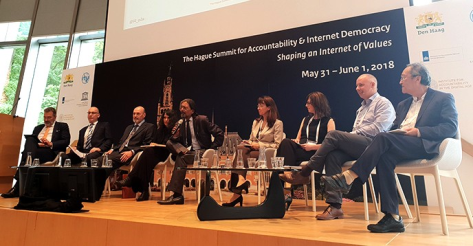
The Hague Summit for Accountability & Internet Democracy attracted high-level, interactive discourse among more than 200 hundred senior policy makers, jurists and information technology professionals from 31 May to 1 June at The Hague Peace Palace.
Opened by the Deputy Prime Ministers of The Netherlands and Republic of Slovenia and the Mayor of the Hague, the inaugural Summit, on “An Internet of Values”, was organized by the Municipality of The Hague and the Institute for Accountability in the Digital Age, with the support of UNESCO and the International Telecommunications Union (ITU).
A number of speakers highlighted the appropriateness of The Hague as a venue for addressing the digital age. Deputy Prime Minister Kajsa Ollongren of the Netherlands recalled the role of The Hague and the scholar Hugo Grotius in defining the principles of Freedom of the Seas (Mare Liberum 1609), a set of the rules in favor of safe and open seas. “And now 400 years later, we have been asked to contribute on how accountability can be addressed over the Internet, and I think together we all hope that the result will be a safe and open Internet,” she said.
Deputy Prime Minister Boris Koprivnikar of the Republic of Slovenia underscored the value of “open as a public good and as a key to transparency and trust,” with the exception of personal, business and government data that must be protected.
Mayor Pauline Krikke of the Hague noted that social media is building bridges but also facilitating deeper social divides where “truth has become elastic.” She affirmed that the city of the Hague can play a role in the digital space through its “great deal of experience and concentration of knowledge as a unique place for international dialogue”.
In his keynote address, UNESCO Assistant Director-General for Communication and Information Moez Chakchouk urged for a multi-stakeholder approach based on the R.O.A.M principles for Internet Universality. The R.O.A.M. acronym stands for human Rights, Openness, Accessibility for all, and Multistakeholder participation and was endorsed by UNESCO’s 195 Member States in 2015 following a process of consultation with some 2,000 Internet stakeholders.
“Addressing accountability on the Internet depends on a commitment to the R.O.A.M. principles, supported by a robust focus on digital skills and Media and Information Literacy for every citizen we can reach,” Dr Chakchouk said, highlighting key programmes of UNESCO. “Media and Information Literacy empowers citizens to understand the functions of online information providers, to critically evaluate online content, and to make informed decisions as users and producers of information and media content online.”
Vint Cerf, chief Internet Evangelist at Google, called in a video message for a balanced approach that respects rights and freedom, where “the key is to train to think critically, how to reject false information and accept content of value”.
ITU Secretary-General Houlin Zhao spoke of the role of a trusted Internet in achieving the Sustainable Development Goals. “As we speak, more than half of the world’s population is not using the internet yet,” he said. According to the ITU Secretary-General, the common objective must be to provide access to all, regardless of age, wealth or disability as well as to ensure that Artificial Intelligence does not serve to deepen social biases and exclusion.
Mr. Indrajit Banerjee, Director of UNESCO’s Knowledge Societies Division, moderated two sessions at the Hague Summit. The first session consisted of a discussion on the concept of an “Internet of Values” and the basic principles that everyone could agree upon in order to ensure that we collectively build an Internet, which respects human rights and the rule of law. The second panel focused on the role that the media could play in ensuring accountability on the Internet.
The Hague Summit featured more than 30 invited presenters representing Members of Parliament, as well as media professionals, jurists, civil society, international organizations, educators and information technology representatives.
Speakers upheld multi-stakeholder modalities as a means to avoid disproportionate or unintended consequences of internet regulation, such as in a manner that directly violates legitimate criticisms of government policies.
“The goal of Internet governance is to engage all impacted stakeholders at all meaningful points of the discussion,” said Lynn Saint Amour, Chair of the United Nations Internet Governance Forum.
A number of speakers underscored that offline rights apply online as well, fundamental rules and values of society and international norms apply also in the digital age. One speaker noted that there is only one world, not an analog and digital one, no two sets of rules or ethics, but a need to adjust and align them.
Experts in Cybercrimes noted that the dark net is as much as 500 times larger than the surface Internet. It was reported that only a small fraction of reported Cybercrimes are followed up upon, with up to 96% of cases brought to the attention of authorities never prosecuted. Incitement to hate and terror serve to silence freedom of expression in some parts of the world.
Aimee van Wynsberghe, Director of the Foundation for Responsible Robotics, compared Internet accountability as an opportunity analogous to sustainable development, which was once seen as a potential constraint but now is viewed as a social necessity and business opportunity. “Accountability is the new sustainability” she suggested, as a disruptive business opportunity with the end goal of saving and sustaining the Internet.
Posted on :
Jun 07, 2018